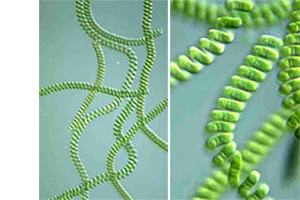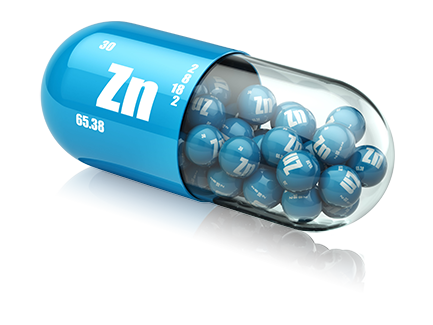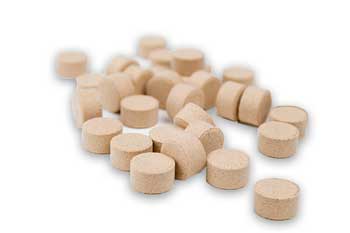Spirulina Extract
providing LCEPEEN complex

Spirulina it is commercial name of concentrated and freeze-dried cyanobacteria genus Arthrospira platensis. These bacteria, previously called blue-green micro-algae, are one of the oldest life forms on Earth. In fact, this blue-green microalgae is partly responsible for producing the oxygen in the planet's atmosphere that billions of years ago allowed the planet's originating life forms to develop. Spirulina is the world's first superfood, and one of the most nutrient-rich foods on Earth.
Spirulina has between 55 and 70% protein (more than beef, chicken, and soybeans), 8 essential and 10 non-essential amino acids, as well as high levels of gamma-linolenic acid (GLA), beta-carotene, linoleic acid, arachidonic acid, vitamin B12, iron, calcium, phosphorus, nucleic acids RNA & DNA, chlorophyll, and phycocyanin, a pigment-protein complex that is found only in blue-green algae.
Spirulina is widely used in food and cosmetic industry. Due to its health properties it also became of interest of pharmaceutical industry
There are three kinds extracts of spirulina. The most commont is phycocyanin extract of spirulina that provides bluegreenish pigment. The second type is protein extract of spirulina that is rich source of proteins from algae. The pretty rare is polysaccharide extract of spirulina. Thus Immulina provides a lipopolysaccharide extract of spirulina, marked by manufacturer as LECPEEN™. This LCEPEEN is high-molecular lipopolysaccharide complex that shows in several laboratory tests ability to activate innate immune system. Innate (nonspecific) immunity is the first line of our body defence. It also plays a critical role in the creation an adaptive (specific) immunity, also rthis immunity that is formed after vaccination and/or after sickness.
 Click the scheme to magnify.
Click the scheme to magnify.This Spirulina platensis Extract has been developed by team of scientists at Mississippi University under leadership of dr. David Pasco. The immune-modulation properties of LECPEEN from Spirulina Extract have been widely presented on → Spirulina – the Immune Booster — It is unfortunately under preparation ... sorry!
Dr. David Pasco and his team at the National Center for Natural Product Research at Mississippi University have developed special standardization test for immune activity of LCEPEEN spirulina extract*.
* LCEPEEN extract is standardized for its ability to stimulate the immune system. An activity of 1,000 U is provided, as determined by the company's own monocyte activation test. The extract has exceptional stability and in tests its activity, practically unchanged, is maintained for 5 years from the date of production.
Zinc as zinc gluconate
Immulina provides easy absorbable zinc in a form of zinc gluconate. Each capsule contains 35 mg of zinc gluconate providing 5 mg Zn++, which makes 50 % RDA (recommended daily allowance).

Zinc is an essential trace element for humans and it is vital for many biological functions and plays a crucial role in more than 300 enzymes in the human body. The adult body contains about 3 grams of zinc. Zinc is found in all parts of the body: it is in organs, tissues, bones, fluids and cells. Muscles and bones contain most of the body’s zinc (90%). Particularly high concentrations of zinc are in the prostate gland and semen.
Zinc and Immune System

Zinc is known to play a central role in the immune system, and zinc-deficient persons experience increased susceptibility to a variety of pathogens. The immunologic mechanisms whereby zinc modulates increased susceptibility to infection have been studied for several decades. It is clear that zinc affects multiple aspects of the immune system, from the barrier of the skin to gene regulation within lymphocytes. Zinc is crucial for normal development and function of cells mediating nonspecific immunity such as neutrophils and natural killer cells. Zinc deficiency also affects development of acquired immunity by preventing both the outgrowth and certain functions of T lymphocytes such as activation, Th1 cytokine production, and B lymphocyte help. Likewise, B lymphocyte development and anti-body production, particularly immunoglobulin G, is compromised. The macrophage, a pivotal cell in many immunologic functions, is adversely affected by zinc deficiency, which can dysregulate intracellular killing, cytokine production, and phagocytosis. The effects of zinc on these key immunologic mediators is rooted in the myriad roles for zinc in basic cellular functions such as DNA replication, RNA transcription, cell division, and cell activation. Apoptosis is potentiated by zinc deficiency. Zinc also functions as an antioxidant and can stabilize membranes. This review explores these aspects of zinc biology of the immune system and attempts to provide a biological basis for the altered host resistance to infections observed during zinc deficiency and supplementation.
Low zinc level (zinc deficiency) increases risk of respiratory infection and risk of complications if infection occurs. The disease course might be heavier. Elderly people and people overusing alcohol are particularly imperiled to zinc deficiency. See → Meydani et al. Serum Zinc and Pneumonia in Nursing Home Elderly; Am.J.Clin.Nutr.
Zinc supplementation in small children particularly in developing countries reduces risk of pneumonia and diarrhea and if it would come to disease, the process would be easier and shorter and would have better prognosis. Sources acc. to WHO:
- 1. Preventive Zinc Supplementation
- 2. Zinc in Prevention of Childhood Diarrhea and Respiratory Illnesses
- 3. Zinc in Prevention of Pneumonia in Children
Chosen Beneficial Effects of Zinc
/just to mention the most important/
Zinc is an essential element necessary for the normal function of all organs and body systems. Dietary supplementation of zinc has positive impact on the whole body just to list the most important issues:
- Zinc is vital for cell growth and cell division — It is especially important during pregnancy, for the growing fetus whose cells are rapidly dividing. Zinc also helps to avoid congenital abnormalities and pre-term delivery. Zinc is vital in activating growth - height, weight and bone development - in infants, children and teenagers.
- Zinc is important for our senses and particularly sight, smell and taste — High concentrations of zinc are found in the retina. With age the retinal zinc declines which seems to play a role in the development of age-related macular degeneration (AMD), which leads to partial or complete loss of vision. Zinc may also protect from night blindness and prevent the development of cataracts. Zinc activates areas of the brain that receive and process information from taste and smell sensors. Levels of zinc in plasma and zinc’s effect on other nutrients, like copper and manganese, influence appetite and taste preference. Zinc is also used in the treatment of anorexia.
- Zinc is vital for sexual system of men — It helps maintain sperm count and mobility and normal levels of serum testosterone. Zinc protects the prostate gland from infection (prostatitis) and ultimately from enlargement (prostatic hypertrophy). It also maintains both woman and man libido. Zinc plays a vital role in fertility.
- Zinc is vital for skin, hair and nails — It accelerates the renewal of the skin cells. Zinc creams are used for babies to soothe diaper rash and to heal cuts and wounds. Zinc has also proven effective in treating acne, a problem that affects especially adolescents, and zinc has been reported to have a positive effect on psoriasis, eczema and neurodermitis. Zinc is also used as an anti-inflammatory agent and can help sooth the skin tissue, particularly in cases of poison ivy, sunburn, blisters and certain gum diseases. Zinc is important for healthy hair. Insufficient zinc levels may result in loss of hair, hair that looks thin and dull and that goes grey early. There are also a number of shampoos which contain zinc to help prevent dandruff.
- Zinc is important for digestive system health — Zinc deficiency may lead to peptic ulcer disease and digestive infection (baby diarrhea). It’s also involved in the breakdown of carbohydrates from foods, which are one of the main sources of energy for the body. For this reason, deficiency in zinc can cause low energy levels and contribute to adrenal or chronic fatigue, whereas consuming enough zinc benefits ongoing energy and a healthy metabolism. Zinc also supports liver health – it can help with a liver cleanse, reduces free radical damage, helps with nutrient absorption and allows for proper waste elimination.
Too much Zinc might be harmful
Zinc supplementation seems to be very safe. Zinc has been used therapeutically at a dose of 150 mg/day for months and in some cases for years, and in one case at a dose of up to 2000 mg/day zinc for months. A decrease in copper levels and hematological changes have been reported; however, those changes were completely reversed with the cessation of zinc intake.
However, in some situation overuse of zinc (above 200 mg/day for long time – over 20 times above average dietary requirement) can lead to zinc toxicity.
Zinc may compete with other minerals. Too much zinc in diet may decrease iron, and other minerls (like magnesium, selenium, manganese, copper) absorption, leading to their deficiency. Therefore zinc and iron (and/or other minerals) should be taken at different times of the day.



 Yeast is a remarkable ingredient that helps maintain or regain beauty/health naturally. It is present in functional foods, food supplements and cosmetic products. For many decades now, yeast used in foodstuffs - living or not - has been the subject of countless studies and scientific publications that unanimously recognise its extraordinary nutritional qualities and certain therapeutic benefits. The excellent health/beauty properties of yeast are not only based on long-established experience but also, and above all, on its biochemical composition, which is perfectly well-known today. This composition reveals a wide variety of biological elements (amino acids, minerals, vitamins, enzymes, etc.) that are needed by our organism to function properly (growth, cell metabolism, immune system, etc.) and which our everyday diet does not always provide in sufficient quantity.
Yeast is a remarkable ingredient that helps maintain or regain beauty/health naturally. It is present in functional foods, food supplements and cosmetic products. For many decades now, yeast used in foodstuffs - living or not - has been the subject of countless studies and scientific publications that unanimously recognise its extraordinary nutritional qualities and certain therapeutic benefits. The excellent health/beauty properties of yeast are not only based on long-established experience but also, and above all, on its biochemical composition, which is perfectly well-known today. This composition reveals a wide variety of biological elements (amino acids, minerals, vitamins, enzymes, etc.) that are needed by our organism to function properly (growth, cell metabolism, immune system, etc.) and which our everyday diet does not always provide in sufficient quantity.
